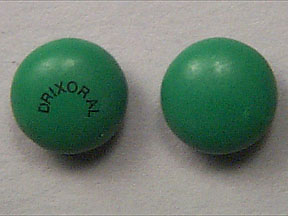Drixoral Cold and Allergy Interactions
There are 491 drugs known to interact with Drixoral Cold and Allergy (dexbrompheniramine/pseudoephedrine), along with 10 disease interactions, and 1 alcohol/food interaction. Of the total drug interactions, 31 are major, 453 are moderate, and 7 are minor.
- View all 491 medications that may interact with Drixoral Cold and Allergy
- View Drixoral Cold and Allergy alcohol/food interactions (1)
- View Drixoral Cold and Allergy disease interactions (10)
Most frequently checked interactions
View interaction reports for Drixoral Cold and Allergy (dexbrompheniramine / pseudoephedrine) and the medicines listed below.
- albuterol
- Aleve (naproxen)
- Ambien (zolpidem)
- amitriptyline
- Aspir 81 (aspirin)
- atorvastatin
- baclofen
- cannabis
- cefuroxime
- Celexa (citalopram)
- cetirizine
- Chlor-Trimeton (chlorpheniramine)
- clopidogrel
- cromolyn
- desloratadine
- Desoxyn (methamphetamine)
- Dexedrine (dextroamphetamine)
- dextromethorphan
- diazepam
- doxycycline
- dupilumab
- Eliquis (apixaban)
- hydrocodone
- ibuprofen
- prednisone
- Prozac (fluoxetine)
- Ritalin (methylphenidate)
- Singulair (montelukast)
- Tylenol (acetaminophen)
- Vitamin B12 (cyanocobalamin)
Drixoral Cold and Allergy alcohol/food interactions
There is 1 alcohol/food interaction with Drixoral Cold and Allergy (dexbrompheniramine / pseudoephedrine).
Drixoral Cold and Allergy disease interactions
There are 10 disease interactions with Drixoral Cold and Allergy (dexbrompheniramine / pseudoephedrine) which include:
- cardiovascular disease
- anticholinergic effects
- asthma/COPD
- cardiovascular
- renal/liver disease
- GI narrowing
- PKU
- BPH
- diabetes
- glaucoma
More about Drixoral Cold and Allergy (dexbrompheniramine / pseudoephedrine)
- Drixoral Cold and Allergy consumer information
- Compare alternatives
- Reviews (52)
- Drug images
- Side effects
- Drug class: upper respiratory combinations
Related treatment guides
Drug Interaction Classification
| Highly clinically significant. Avoid combinations; the risk of the interaction outweighs the benefit. | |
| Moderately clinically significant. Usually avoid combinations; use it only under special circumstances. | |
| Minimally clinically significant. Minimize risk; assess risk and consider an alternative drug, take steps to circumvent the interaction risk and/or institute a monitoring plan. | |
| No interaction information available. |
See also:
Further information
Always consult your healthcare provider to ensure the information displayed on this page applies to your personal circumstances.


